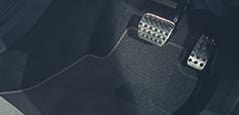Driving in France

Driving in France is a great way to see this beautiful and scenic country. Every year we see thousands of British motorists crossing the channel with their cars to enjoy the numerous delights France has to offer. Many other drivers choose to hire a car upon arrival, preferring to drive a left hand drive vehicle when in Europe.
Whichever option you decide upon, to avoid complications that could result in you getting on the wrong side of the law during your visit, you should be familiar with the basic rules and regulations of driving in France.
Below we set out the documents and items you must carry whenever you are behind the wheel, as well as some general driving tips.
There are a number of important documents you will need to carry whilst driving around France.
- Your full UK driving license, including the photo and paper counterpart. However, if, for whatever reason you don’t have access to both parts, then we recommend you carry your passport with you at all times, or even better, apply for an International Driving Permit before setting off. This can be purchased for about £5.50 from most post office branches.
- Evidence of motor insurance and your vehicle registration document (VSc).
- We also recommend a Green Card and Camping Card International.
- Your passport.
Before you hit the road in France, it’s essential you have all of these other compulsory items:-
- Headlight converters
- Warning triangle
- High visibility vest
- A clearly displayed UK sticker
- First aid kit
Alongside the compulsory items, we recommend that you also carry these:-
- Spare bulb kit
- Fire extinguisher
- Snow socks and snow chains ( depending on the season)
- To help comply with regulations and prepare you for driving in France, take a look at our European Driving Kits to ensure that you are fully equipped for your journey.
Some of the requirements and rules when driving in France are similar to those in the UK, however, take a few minutes to familiarise yourself with the do’s and don’ts listed here;
- All drivers must be 18 or over
- It’s compulsory to wear a seatbelt
- There are toll charges on motorways
- Radar detection devices for speed cameras are not allowed, if you are caught with one you could be fined €1500 or have your vehicle taken away. This also applies to Satellite Navigation or GPS devices, so ensure that you disable this feature in the settings.
- Children under 10 years of age must always sit in the back of the vehicle in an approved child seat
- It is illegal to sound your horn in a built-up area unless you are in danger
- In slow moving and stationary traffic, the last car in the line must have its hazard warning lights switched on
- If you want the car in front to give way, simply flash your lights
- Call 112 if you need the emergency services
- The alcohol limit for all motorists is 50mg and random testing is commonplace. French police may confiscate your licence and your vehicle if you are found over this limit. Saliva testing is also common to check for the presence of drugs.
The French police take speeding very seriously, so familiarise yourself with speed warning signs and the various speed limits before taking to the road.
- Towns – dry/wet roads 50km/h (although in some areas it is 20-30km/h)
- Secondary rural roads – dry roads 90 km/h and wet roads 80km/h
- Dual carriageways and motorways without tolls – dry roads 110km/h and wet roads 100km/h
- Toll motorways – Dry roads 130 km/h and wet roads 100km/h
- Foggy conditions on the motorways – 50km/h
- In the left hand lane on the motorway – minimum speed 80km/h
- However, if you have held your full driving license for less than 3 years, you must not exceed 100km/h on urban motorways, 110km/h on motorways or 80km/h on other roads
And note, there are low emission zones in Paris, Lyon and Grenoble which you should be aware of if you are driving in or passing through these areas.
We hope this post prepares you for driving in France, and remember to take a look at our European driving kits and accessories before setting off.
Disclaimer
Even though we try to ensure the information given here is current – rules and regulations do sometimes change without warning, so please check for revisions as we cannot be held responsible for any infringements to French driving laws.




